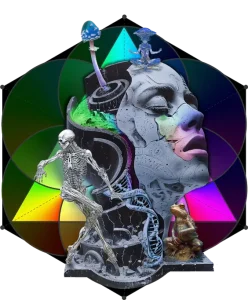The renewed interest in psychedelic drugs—including psilocybin, lysergic acid diethylamide (LSD), and MDMA—has reignited discussions about their potential for both therapeutic and recreational use. While recent studies have shown promising results for the use of psychedelics in treating mental health disorders such as depression, anxiety, and PTSD, understanding the long-term effects of psychedelic use is crucial for ensuring safe and informed applications. Both positive and adverse reactions have been observed, and research into the long-term consequences is still unfolding.
In this extended article, we will explore the long-term psychedelic effects on brain function, mental health, and overall well-being, drawing on findings from clinical studies, observational studies, and anecdotal reports. We’ll examine both the therapeutic potential and the possible risks, focusing on serotonergic psychedelics, their interactions with psychiatric disorders, and their antidepressant effects.
Understanding Psychedelics: What They Are and How They Work
Psychedelic drugs, often referred to as classic psychedelics, include substances such as psilocybin, LSD, DMT, and mescaline. These compounds primarily interact with the brain’s serotonin receptors, particularly the 5-HT2A receptor, which leads to altered states of perception, mood, and cognition.
- Psilocybin: Found in certain species of mushrooms, this substance is converted into psilocin in the body, which binds to serotonin receptors to induce effects such as visual hallucinations and changes in emotional processing.
- LSD: Short for lysergic acid diethylamide, LSD is a powerful synthetic psychedelic that produces long-lasting mystical-type experiences, visual hallucinations, and shifts in sensory perception.
- MDMA: Known for its ability to enhance empathy and emotional openness, MDMA differs from classic psychedelics but has also been studied for its potential in psychedelic-assisted therapy.
Positive Long-Term Effects of Psychedelic Use
1. Reduction in Depressive Symptoms
One of the most well-documented long-term benefits of psychedelics is their ability to reduce depressive symptoms in individuals with treatment-resistant depression. In clinical trials involving healthy volunteers and patients with depressive disorder, psychedelics have shown potential for creating lasting changes in mood. For instance, a single dose of psilocybin has been linked to decreases in depression that persist for several months.
In a pivotal study by Griffiths et al., participants who received high psychedelic doses of psilocybin reported significant improvements in mood, with many experiencing long-term relief from depressive symptoms. This research highlights how a single dose of a psychedelic can create profound and enduring changes in brain chemistry, offering a promising alternative for individuals who do not respond to conventional antidepressants.
2. Neuroplasticity and Cognitive Flexibility
Another positive long-term effect of psychedelics is their ability to promote neuroplasticity—the brain’s ability to form new neural connections. Studies have shown that serotonergic psychedelics like psilocybin and LSD can encourage the growth of dendritic spines (small protrusions on neurons that help facilitate communication between cells). This enhanced neuroplasticity is believed to underlie many of the therapeutic benefits of psychedelics, as it allows the brain to “reset” and adopt new, healthier patterns of thinking.
Users of psychedelics have also reported increased cognitive flexibility—the ability to approach problems from new perspectives and adapt to changing circumstances. This has been particularly noted in individuals who incorporate psychedelics into a structured practice, such as psychedelic-assisted therapy or ceremonial use.
3. Spiritual Growth and Existential Insights
Many long-term users of psychedelics report experiencing profound spiritual experiences that have a lasting impact on their sense of self, their relationships, and their understanding of the universe. These experiences are often described as moments of ego dissolution, where the boundaries between the self and the external world blur, leading to feelings of unity and interconnectedness. The mystical-type experience often associated with psychedelic doses of psilocybin or LSD has been shown to lead to lasting positive changes in individuals’ worldviews and sense of purpose.
In Griffiths et al.’s study on psilocybin, participants who had mystical-type experiences during their sessions reported long-term improvements in their overall life satisfaction, with some describing these experiences as among the most meaningful in their lives.
Potential Risks and Adverse Reactions
While there are many potential benefits, it is important to also address the adverse reactions and long-term risks associated with the use of psychedelics. Although psychedelics are generally considered safe in controlled settings, prolonged or frequent use, especially without guidance, can lead to challenging experiences and unintended consequences.
1. Hallucinogen Persisting Perception Disorder (HPPD)
One of the most concerning long-term effects is Hallucinogen Persisting Perception Disorder (HPPD). This rare condition involves persistent visual hallucinations or distortions long after the effects of the psychedelic have worn off. Individuals with HPPD may experience trails of light, halos around objects, or geometric patterns in their visual field. The exact cause of HPPD remains unclear, but it is believed to be related to changes in the brain’s visual processing pathways triggered by the psychedelic experience.
While most psychedelic users do not develop HPPD, those who do can find the condition to be distressing and disruptive. It is more likely to occur in individuals who use psychedelics frequently or at high doses.
2. Psychosis and Mental Health Disorders
Though psychedelics are considered non-addictive, they can trigger or exacerbate symptoms of psychiatric disorders in vulnerable individuals. For example, people with a family history of schizophrenia or bipolar disorder may be at a higher risk of experiencing psychosis after using psychedelics. This is why screening for mental health disorders is critical in therapeutic settings.
Griffiths et al. noted that individuals with certain mental health conditions may experience challenging experiences or negative reactions, including paranoia, delusions, or panic, particularly if they are not in a safe or supportive environment.
3. Potential Cognitive Decline
While short-term studies suggest that psychedelics can enhance cognitive flexibility, there are concerns about the potential for cognitive decline with prolonged or frequent use. Some anecdotal reports and early research suggest that frequent users of psychedelics, especially those who take high doses regularly, may experience difficulties with memory, focus, and cognitive control over time.
This is particularly true for substances like MDMA, which has been shown in some studies to cause neurotoxicity when used frequently at high doses. Though clinical studies have not yet conclusively determined whether psychedelics like psilocybin or LSD carry the same risks, it is an area that warrants further investigation.
The Role of Set, Setting, and Integration in Long-Term Effects
The long-term effects of psychedelics are highly dependent on the context in which they are used. The concepts of “set” (the user’s mindset) and “setting” (the physical and social environment) play a crucial role in shaping both the immediate and long-term outcomes of psychedelic use. Individuals who approach psychedelics with clear intentions and in supportive environments tend to report more positive outcomes, both during the trip and in the months or years that follow.
Integration is also a key factor. Proper integration involves reflecting on the psychedelic experience and incorporating the lessons learned into one’s daily life. This process is often facilitated by therapists or guides, who help users make sense of their experiences and apply the insights to their mental and emotional well-being. Without integration, even positive psychedelic experiences can fade, and users may struggle to apply the lessons learned to their everyday lives.
Legal and Ethical Considerations: The Importance of Informed Consent
As psychedelics become more accepted in therapeutic settings, the importance of informed consent cannot be overstated. Participants in clinical trials and psychedelic-assisted therapy must fully understand the potential risks and benefits, as well as the possibility of adverse effects like HPPD or psychosis. By ensuring that individuals are fully informed, researchers and therapists can better support participants and minimize the risks of long-term harm.
Additionally, ethical considerations around access, equity, and safety are critical as psychedelics move toward broader legal acceptance. Ensuring that these substances are used responsibly and with proper oversight is essential for maximizing their therapeutic potential while minimizing harm.
Conclusion: Weighing the Risks and Benefits of Long-Term Psychedelic Use
The long-term effects of psychedelic use are varied and depend heavily on the frequency of use, the dosage, and the context in which the drugs are taken. While clinical studies and observational research suggest that psychedelics hold great promise for treating depressive disorders, anxiety, and other mental health conditions, they are not without risks. Visual hallucinations, cognitive impairments, and the potential for triggering psychosis interms of pre-existing psychiatric disorders remain important considerations. Individuals who are predisposed to conditions like schizophrenia or bipolar disorder should exercise extreme caution, as psychedelics may exacerbate or trigger psychosis in vulnerable users.
On the positive side, the antidepressant effects of psychedelics—particularly in patients with depressive symptoms—continue to show promise, especially when used in conjunction with psychotherapy. Clinical trials involving healthy volunteers have shown that even a single dose of psilocybin can lead to lasting reductions in depressive symptoms and improvements in overall well-being. This highlights the potential of psychedelic therapy to offer meaningful, long-term solutions for individuals struggling with mental health disorders.
In conclusion, while psychedelic drugs like psilocybin and LSD show significant therapeutic promise, it is essential to approach their use with careful consideration of both the positive and adverse effects. With proper informed consent, structured settings, and attention to set and setting, psychedelics can provide lasting benefits for mental health, but they must be used responsibly to mitigate the risks of challenging experiences and long-term consequences


